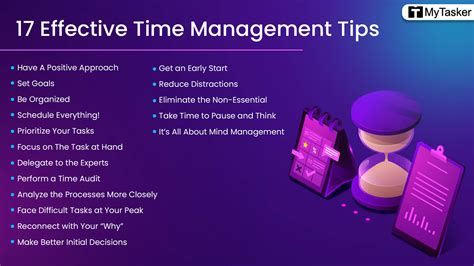Efficiently utilizing your time can prove to be a challenging task, especially in today's fast-paced world. However, employing effective time management techniques can significantly enhance your productivity levels. With a plethora of strategies to choose from, it can be overwhelming to identify the most beneficial ones for your personal and professional life.
Seeking ways to optimize your time and maximize output is a constant pursuit. By incorporating proven methodologies and making conscious adjustments to your daily routine, you can master time management and achieve greater efficiency across all aspects of your life. Whether you are an ambitious professional, a busy student, or a multitasking individual striving to strike a balance, these top 10 strategies will pave the way for enhanced productivity.
1. Prioritize Tasks: Establishing clear priorities is crucial for effective time management. Identifying urgent versus important tasks allows you to allocate your time wisely and make prompt decisions on what requires immediate attention.
Example: Rather than dedicating excessive time to low-priority tasks, prioritize those that align with your long-term goals, as this will yield substantial results in the future.
2. Set Measurable Goals: Defining specific and measurable goals is essential for focusing your efforts and maintaining a sense of direction. Break down larger objectives into smaller, achievable targets to ensure steady progress and avoid feeling overwhelmed.
Example: Instead of aiming to complete an entire project in one sitting, establish realistic milestones and allocate time frames to each stage. This approach encourages a sense of accomplishment while keeping you motivated and on track.
Effectual Approaches to Efficiently Manage Your Time

In today's fast-paced world, it is crucial to employ effective strategies to wisely organize and allocate your time. By implementing a systematic approach to managing your time, you can enhance your productivity and accomplish your tasks more efficiently. This section will explore some valuable techniques and principles that can assist you in making the most of your time.
| Technique | Description |
|---|---|
| Prioritization | Assigning importance to tasks based on their urgency and significance, allowing you to focus on high-priority activities first. |
| Time Blocking | Allocating specific time blocks for different tasks or activities, aiding in concentration and preventing distractions. |
| Goal Setting | Establishing clear and achievable goals, providing direction and motivation to accomplish tasks within a specified timeframe. |
| Delegation | Entrusting certain tasks to others, freeing up your time for more critical responsibilities. |
| Eliminating Time Wasters | Identifying and eliminating activities that consume excessive time but contribute little to your productivity. |
| Time Tracking | Maintaining records of how you spend your time, enabling you to identify areas of improvement and make necessary adjustments. |
| Setting Realistic Deadlines | Ensuring that deadlines are reasonable and achievable so that you can effectively manage your time without compromising the quality of your work. |
| Utilizing Technology | Leveraging productivity tools and apps to streamline your tasks, automate repetitive processes, and enhance overall efficiency. |
| Breaking Tasks into Micro-Steps | Dividing complex projects or tasks into smaller, manageable steps, making them less overwhelming and easier to tackle. |
| Self-Care and Rest | Recognizing the importance of self-care, including rest and relaxation, to maintain optimal productivity and prevent burnout. |
By implementing these effective strategies for managing your time wisely, you can optimize your productivity, reduce stress, and achieve your goals more efficiently. Experiment with different techniques and find what works best for you, as each individual's approach to time management may vary. Remember, a well-structured and balanced schedule is the key to unlocking your true potential.
Prioritizing Tasks: The Key to Efficient Time Organization
When it comes to effectively managing our time, one of the most crucial aspects is understanding the importance of prioritizing tasks. Prioritization allows us to allocate our time and resources efficiently, ensuring that we focus on the most significant and impactful activities first.
By prioritizing tasks, we can optimize our productivity and enhance our overall time management skills. It involves identifying and categorizing the tasks based on their importance, deadlines, and expected outcomes. Prioritization enables us to allocate our limited time and energy to the tasks that yield the highest value and impact.
| Benefits of Prioritizing Tasks |
|---|
| 1. Improved productivity |
| 2. Enhanced focus |
| 3. Reduced stress |
| 4. Effective time utilization |
| 5. Achievement of goals |
When we prioritize tasks, we gain a clear understanding of what needs to be done first and what can be delegated or postponed. This clarity helps us stay focused and prevents us from getting overwhelmed by numerous tasks competing for our attention. Prioritization also aids in reducing stress as we tackle the most critical tasks early on, creating a sense of accomplishment and allowing us to approach other responsibilities with a calm mind.
In addition to productivity benefits, effective prioritization allows us to make the best use of our time. By devoting our time to tasks aligning with our goals, we can move closer to achieving them. It helps us set realistic deadlines, allocate resources efficiently, and make informed decisions about how to best utilize our time.
In conclusion, prioritizing tasks is the cornerstone of efficient time organization. By understanding the significance of each task and aligning them with our goals, we can maximize our productivity, reduce stress, and ultimately achieve success in managing our time effectively.
Set Clear Goals: How to Stay Focused and Motivated

In order to optimize your efficiency and maximize your accomplishments, it is crucial to establish distinct objectives that drive your actions. By setting clear goals, you provide yourself with a sense of direction and purpose, enabling you to stay focused and motivated throughout your journey.
1. Define Your Ambitions: Begin by reflecting on your aspirations, both personally and professionally. What do you hope to achieve in the short-term and long-term? Identify the areas where you want to excel and outline the specific outcomes you desire.
2. Prioritize Your Objectives: Once you have established your ambitions, prioritize them based on their importance and urgency. Determine which goals require immediate attention and allocate your time and resources accordingly.
3. Break Down Your Goals: To avoid feeling overwhelmed, break your goals down into smaller, manageable tasks. This allows you to tackle each component individually, maintain better focus, and track your progress effectively.
4. Set SMART Goals: Ensure that your goals are Specific, Measurable, Attainable, Relevant, and Time-based. This framework provides structure and clarity, making it easier to measure your progress and evaluate your success.
5. Create an Action Plan: Develop a detailed plan outlining the specific steps and actions required to achieve each goal. This roadmap acts as a guide and ensures that you stay on track, avoiding unnecessary distractions and detours.
6. Maintain a Positive Mindset: Cultivate a positive attitude towards your goals. Visualize your success and believe in your abilities. Surround yourself with supportive influences, celebrate small victories, and stay motivated even in the face of challenges.
7. Monitor and Review: Regularly assess your progress towards your goals. Keep track of the tasks completed and evaluate their effectiveness. Modify your action plan as needed, and make adjustments to stay aligned with your objectives.
8. Stay Organized: Implement effective organizational systems and tools to manage your time and tasks efficiently. Keep your workspace tidy, schedule your activities, and utilize technology platforms that help streamline your workflow.
9. Eliminate Distractions: Identify potential distractions and take proactive steps to minimize their impact. Remove unnecessary clutter from your environment, limit distractions caused by technology, and establish boundaries to protect your dedicated time for goal achievement.
10. Stay Committed: Lastly, remain committed to your goals and be resilient in the face of obstacles. Stay disciplined, consistent, and flexible when necessary. Remember that setbacks are an inevitable part of the journey, and perseverance is key to achieving your desired outcomes.
By setting clear and meaningful goals, you equip yourself with a roadmap for success. With focus and motivation, you can effectively manage your time and make significant strides towards personal and professional growth.
Achieving Efficiency: Overcoming the Temptation of Procrastination
One of the biggest challenges we face when striving for optimal productivity is the tendency to delay or avoid tasks that are essential to our success. This all-too-familiar enemy is known as procrastination. In order to effectively manage our time and increase our productivity, it is imperative that we learn techniques to overcome the temptation of procrastination.
Here are some practical strategies to help you conquer procrastination and accomplish your tasks efficiently:
- Set Clear Goals: Clearly define your goals and prioritize them, ensuring that you have a clear sense of purpose and direction.
- Break Tasks into Smaller Steps: Large tasks can be overwhelming, causing us to delay starting them. Break them down into smaller, more manageable steps to make the process less daunting.
- Create a Schedule: Develop a structured schedule, allocating specific time slots for each task. This ensures that procrastination has no room to creep in.
- Utilize Time Blocking: Implement time blocking techniques, where you dedicate designated periods solely to focusing on specific tasks without any distractions.
- Eliminate Distractions: Identify and remove any distractions that hinder your concentration, such as turning off social media notifications or finding a quiet workspace.
- Practice the Two-Minute Rule: If a task takes less than two minutes to complete, do it immediately instead of putting it off for later.
- Reward Yourself: Create a reward system for completing tasks or reaching milestones. This will help boost motivation and reinforce positive behavior.
- Find an Accountability Partner: Share your goals and progress with someone you trust, who can hold you accountable and provide support when needed.
- Visualize Success: Envision yourself successfully completing tasks and achieving your goals. This positive visualization can help overcome procrastination and stay focused.
- Practice Self-Reflection: Regularly evaluate your progress, identify any patterns of procrastination, and adjust your strategies accordingly to foster continuous improvement.
By implementing these techniques and consistently working to overcome the temptation of procrastination, you can significantly enhance your productivity and achieve your goals more efficiently.
Delegate and Outsource: Maximizing Efficiency through Effective Resource Allocation

In today's fast-paced work environment, maximizing productivity is crucial for organizations and individuals alike. One effective strategy to achieve this is through efficient resource allocation by delegating and outsourcing tasks.
Delegation involves assigning tasks to others who possess the necessary skills and knowledge to handle them effectively. By distributing workload to capable individuals, it allows team members to focus on their strengths, which ultimately leads to increased productivity. Effective delegation also fosters a sense of trust and motivation among team members, as they feel valued and empowered to contribute their expertise to the team's goals.
Outsourcing, on the other hand, occurs when tasks or processes are entrusted to external parties or specialized professionals. This enables organizations to tap into specific skills and expertise that may not be available internally. By outsourcing non-core or time-consuming activities, businesses can allocate their resources more efficiently, redirecting their focus towards core objectives and enhancing overall productivity.
When considering delegation and outsourcing, it is essential to identify tasks that can be effectively transitioned to others without compromising quality or critical decision-making. By prioritizing and categorizing tasks based on their importance and the level of expertise required, individuals and organizations can determine which activities are suitable for delegation or outsourcing.
- Delegating routine administrative tasks:
- Outsourcing specialized tasks:
- Collaborating with freelancers or contractors:
- Utilizing technology and automation:
- Developing clear communication channels:
- Providing training and support:
- Establishing performance metrics:
- Regularly reviewing and adjusting delegation/outsource efforts:
In conclusion, effective resource allocation through delegation and outsourcing can significantly enhance productivity by leveraging the expertise and skills of others. By strategically assigning tasks and partnering with external specialists, individuals and organizations can focus their energies on core objectives, maximize efficiency, and achieve their goals in a timely manner.
Mastering the Art of Allocating Time for Different Activities: The Power of Time Blocking
In today's fast-paced world, effectively managing your time has become more essential than ever. One powerful technique that can significantly enhance your productivity is time blocking. By strategically allocating dedicated time blocks for various activities, you can optimize your focus, streamline your workflow, and achieve better work-life balance.
Embracing Time Blocking
Time blocking involves dividing your day into distinct chunks of time, each allocated to a specific task or activity. By creating this structured schedule, you give yourself a clear roadmap, eliminating distractions and increasing your efficiency. Embracing the concept of time blocking allows you to become the master of your time, rather than being controlled by it.
The Benefits of Time Blocking
Time blocking offers numerous benefits. It helps you prioritize tasks, ensuring that important activities receive the attention they deserve. By dedicating focused time to specific tasks, you can enhance your concentration and avoid multitasking, which can often lead to reduced productivity and quality of work.
Additionally, time blocking allows you to proactively manage interruptions and distractions. By designating specific time slots for email checking, meetings, and other common disruptions, you can maintain your focus on important tasks during undisturbed intervals, improving your overall efficiency and output.
Implementing Effective Time Blocks
To make the most out of time blocking, it is crucial to plan ahead and create realistic and achievable blocks. Start by identifying your priorities and breaking down your tasks into manageable segments. Assign each task a dedicated time block based on its importance and urgency, ensuring you allocate sufficient time for completion.
During each time block, eliminate any possible distractions, such as turning off notifications on your electronic devices and finding a quiet workspace. Emphasize committing fully to the task at hand, utilizing techniques such as the Pomodoro Technique (working in focused intervals followed by short breaks) to maintain productivity and energy levels.
Flexibility and Adaptability
While time blocking provides structure and organization to your day, it is essential to remain flexible and adaptable. As unexpected events or urgent tasks arise, be prepared to adjust your schedule accordingly. By being open to modifications, you can accommodate unforeseen circumstances without compromising other important commitments.
The Takeaway
Time blocking is a powerful time management technique that can revolutionize your productivity and help you achieve a better work-life balance. By effectively allocating your time to specific activities, embracing focus, and proactively managing distractions, you can take control of your day, optimize your efficiency, and strive towards greater success.
Minimizing Distractions: Strategies to Maintain Focus and Enhance Efficiency in the Digital Era

In today's fast-paced digital age, it has become increasingly challenging to stay concentrated and productive amidst a myriad of distractions. From constant notifications on our smartphones to the temptation of browsing through social media, it is essential to develop strategies that allow us to minimize these distractions and focus on the task at hand. This section will explore effective methods to stay focused and enhance efficiency in our daily lives.
| 1. Establishing a Distraction-free Workspace |
| Creating an environment free from potential distractions can greatly enhance productivity. Designate a dedicated workspace, free from unnecessary clutter and equipped with the essentials needed for efficient work. |
| 2. Managing Notifications and Setting Priorities |
| Disable non-essential notifications on your devices and prioritize the important ones. This allows you to focus on essential tasks without getting constantly interrupted by unnecessary alerts. |
| 3. Implementing Time-blocking Techniques |
| Utilize time-blocking techniques to allocate specific periods of time for different tasks or activities. This structured approach helps you prioritize your work and ensures that you dedicate focused time to each task. |
| 4. Setting Realistic Goals and Deadlines |
| Establish realistic goals and deadlines for yourself, allowing you to have a clear direction and a sense of urgency. This helps in maintaining focus and ensures that tasks are completed in a timely manner. |
| 5. Practicing Mindfulness and Meditation |
| Engage in mindfulness techniques and meditation exercises to develop better control over your thoughts and attention. This practice enables you to refocus and reduce the impact of external distractions. |
| 6. Utilizing Website and App Blockers |
| Take advantage of website and app blockers that restrict access to distracting websites or applications during dedicated work periods. These tools help maintain discipline and prevent unnecessary diversions. |
| 7. Practicing the Pomodoro Technique |
| Implement the Pomodoro Technique, which involves working intensively for short periods of time, followed by brief breaks. This method helps improve focus, productivity, and overall time management skills. |
| 8. Establishing Boundaries and Communicating Expectations |
| Set clear boundaries with colleagues, friends, and family members regarding your availability during working hours. Communicate your expectations for uninterrupted focus, ensuring that your time is respected. |
| 9. Practicing Single-tasking |
| Avoid multitasking and instead focus on one task at a time. By dedicating your attention solely to a single task, you can increase efficiency and produce higher-quality work. |
| 10. Taking Regular Breaks and Practicing Self-care |
| Make sure to schedule regular short breaks throughout your day to recharge and rejuvenate. Prioritize self-care activities such as exercise, meditation, or engaging in hobbies to maintain mental well-being and overall productivity. |
By implementing these strategies and embracing a proactive approach towards minimizing distractions, you can regain control over your time, maintain focus, and increase productivity in the digital age.
FAQ
What are some effective time management tips for increasing productivity?
Some effective time management tips for increasing productivity include prioritizing tasks, setting goals, creating a schedule, avoiding multitasking, and taking regular breaks.
How can I prioritize tasks effectively?
To prioritize tasks effectively, you can use techniques such as the Eisenhower Matrix, which categorizes tasks based on their urgency and importance. You can also consider the potential impact and deadline of each task when determining its priority.
What are the benefits of setting goals when it comes to time management?
Setting goals helps you stay focused and motivated, provides a clear direction for your actions, and allows you to measure your progress. By setting specific and achievable goals, you can better manage your time and work towards your desired outcomes.
How can creating a schedule help with time management?
Creating a schedule helps you allocate specific time slots for different tasks and activities. It allows you to plan your day effectively, ensure that you have enough time for important tasks, and minimize distractions. A schedule helps you stay organized and ensures that your time is utilized efficiently.
Is multitasking an effective time management strategy?
No, multitasking is generally not an effective time management strategy. It can lead to decreased productivity, as it divides your attention and focus among multiple tasks. It is more efficient to focus on one task at a time and give it your full attention before moving on to the next.



